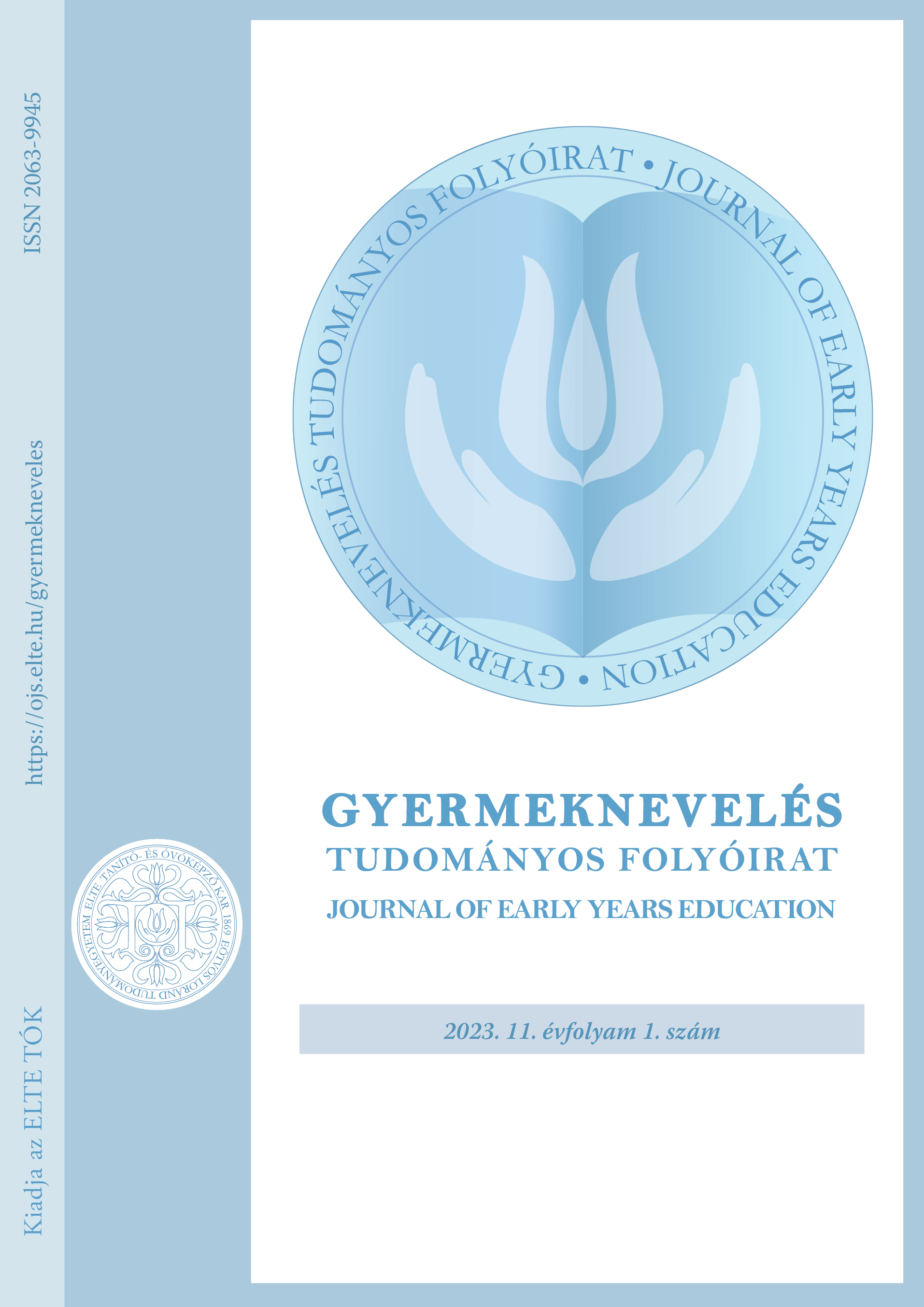Reading the world: English-language literatures as a tool for fostering critical language awareness
DOI:
https://doi.org/10.31074/gyntf.2023.1.154.181Kulcsszavak:
literature pedagogy, critical pedagogy, community-based action research, critical language awareness, world Englishes, Margery KempeAbsztrakt
This paper summarises how a critical pedagogical approach was joined with community-based action research to foster a critical language awareness (CLA) perspective in redesigning and implementing the course, Practice in communicating English literature. Held at Eötvös Loránd University’s Faculty of Primary and Pre-School Education (ELTE TÓK) as a part of the English specialisation programme in bilingual education for pre-service primary teachers, the curriculum used for teaching this course originally emphasised literary history, canonical works, chronological order, and literacy, all earmarks of the kind of literature pedagogy most commonly employed in Hungarian classrooms. The questions investigated in this research therefore examine whether students socialised in the literature pedagogy methods listed above would react positively to unfamiliar materials and practices; whether literature could promote language learning in a way that emphasises content over literacy; and whether literature could motivate adult language learners to become autonomous language users who possess their own, English-language identity. The example of the first known, English-language autobiography, The Book of Margery Kempe (1501/1985), will provide a set of practices (including storytelling, creative writing, role play and debate) for promoting critical language awareness among pre-service primary teachers. Redefining the aims and material for Practice in communicating English literature demanded further investigation in affirming its effectiveness while assessing the need to expose students to a broader range of cultural influences. The qualitative methods of document/coursebook analysis, observation, and a questionnaire conducted with students provide further input in determining whether the selected curriculum promotes CLA and Krachu’s definition of world Englishes (1996).
Letöltések
Hivatkozások
A közoktatás indikátorrendszere 2021 [The indicator system for public education, 2021]. (2021). ELKH. https://kti.krtk.hu/wp-content/uploads/2022/02/A_kozoktatas_indikatorrendszere_2021.pdf.
A közoktatás indikátorrendszere 2015 [The indicator system for public education, 2015]. 2015. MTA. http://econ.core.hu/file/download/kozoktatasi/indikatorrendszer.pdf.
Achebe, C. (2006). Things fall apart. Penguin Books.
Arató, L. (1996). Hermeneutika, diákbefogadó, irodalomtanítás [Hermeneutics, student inclusion, literature education]. Iskolakultúra, 6(2), 20–
Boovy, B. (2016). German beyond the classroom. From local knowledge to critical language awareness. Die Unterrichtspraxis/Teaching German, 49(2), 140–146. https://doi.org/10.1111/tger.12007
Chen, G. M. & Starosta, W. J. (2000). The development and validation of the intercultural sensitivity scale. Human Communication, 3, 1–15. https://doi.org/10.1037/t61546-000
Common European framework of reference for languages: Learning, teaching assessment (2001). Language Policy Unit. www.coe.int/lang-CEFR
Freire, P. (1973). Education for critical consciousness. Seabury.
Freire, P. (1993). Pedagogy of the oppressed. Peter Lang.
Freire, P. (1997, Ed.). Mentoring the mentor: A critical dialogue with Paulo Freire. Peter Lang.
Fairclough, N. (1992). Introduction. In Fairclough, N. (Ed.), Critical Language Awareness (pp. 1–29). Longman.
Fenyő, Gy. D. (1992). Az irodalomtanítás ellentmondásai III. [Contradictions in literature pedagogy, III.] Iskolakultúra, 1(7-8), 18–22.
Fűzfa, B. (2016). Élményközpontú irodalomtanítás a harmadik évezredben [Experience-based literature education in the third century]. In B. Fűzfa (Ed.), Élményközpontú irodalomtanítás [Experience-based literature education] (pp. 9–43). Savaria University Press.
Giroux, H. A. (1988). Teachers as intellectuals: Toward a critical pedagogy as learning. Bergin and Garvey.
Giroux, H. A. (2011). On critical pedagogy. Bloomsbury.
Gonda, Zs. & Molnár, G. T. (2019). Irodalomértés és kreatív szövegfeldolgozás a digitális magyarórán [Understanding literature and creative textual analysis in the digital Hungarian classroom]. Iskolakultúra, 29(4–5), 33–49. https://doi.org/10.14232/ISKKULT.2019.4-5.33
Hawkins, M. & Norton, B. (2009). Critical language teacher education. In A. Burns & J. Richards (Eds.), Cambridge guide to second language teacher education. (pp. 30-39). Cambridge University Press. https://doi.org/10.1017/9781139042710.006
Karlovitz, J. (1992). Új irodalomtanítási koncepció körvonalai [The outline of a new concept in literature pedagogy]. Iskolakultúra, 9–17.
Kerettanterv [Framework curriculum] (2020). https://www.oktatas.hu/kozneveles/kerettantervek/2020_nat 2021.11. 09.
Kerettanterv a gimnáziumok 9-12. évfolyamára [Framework curriculum for secondary schools, grades 9-12]. 2020. https://www.oktatas.hu/kozneveles/kerettantervek/2020_nat/kerettanterv_gimn_9_12_evf
Kramsch C., Kramsch O. (2000). The Avatars of literature in language study. The Modern Language Journal, 84(4), 553–573. https://doi.org/10.1111/0026-7902.00087
Herédi. R. (2021). Az irodalomtanítás 2021-ben: célok, kötelező olvasmányok, Nemzeti alaptanterv, érettségi [Literature pedagogy in 2021: Aims, compulsory literature, National Core Curriculum, maturation exam]. In Medovárszki, I. (Ed.), Tantárgypedagógiai kaleidoszkóp: 2021 (pp. 71–80).
Hooks, B. (1994). Teaching to transgress: Education as the practice of freedom. Routledge. https://doi.org/10.3366/para.1994.17.3.270
Kempe, M. (1501/1985). The book of Margery Kempe. Penguin Books. Kiss, D. (2021). Irodalomtanítás a digitális fordulat határán [Literature education on the border of the digital shift]. Korunk, 2, 66–72. https://doi.org/10.47630/KULG.2022.66.1-2.72
Krachu, B. B. (1996). World Englishes: Agony and ecstasy. The Journal of Aesthetic Education, 30(2), 135–155. https://doi.org/10.2307/3333196
Lázár, I. (2011). Teachers’ beliefs about integrating the development of intercultural communicative competence in language teaching Case studies of Hungarian pre-service English teachers. ForumSprache, 5, 113–127.
Leeman, J. & Rabin, L. (2007). Reading language: Critical perspectives for the literature classroom. Hispania, 90(2), 304–315.
Neumann, J. W. (2015). Bilingual Education, Culture, and the Challenge of Developing Freirean Dispositions in Teacher Education. In Counterpoints: Paulo Freire, The global legacy (pp. 431–443). Peter Lang AG. https://www.jstor.org/stable/45178228
Nemzeti alaptanterv [National Core Curriculum]. 2020. Magyar Közlöny, 17, 290-466. MK_20_017%20(1).pdf
Nikolov, M. (2003). Az idegennyelv-tanítás megújulásának hatásai [The effects of the renewal of foreign language teaching methodology]. Új Pedagógiai Szemle, 53, 46–57. http://epa.oszk.hu/00000/00035/00069/2003-03-ko-Nikolov-Idegennyelv.html
Pethőné, N. Cs. (2005). Módszertani kézikönyv [Handbook on methodology]. Korona Kiadó.
Richardson, V. (2003). Preservice Teachers’ Beliefs. In Raths, J. & McAninch, A. R. (Eds.), Teacher Beliefs and Classroom Performance: The Impact of Teacher Education (pp. 1–22). Information Age Publishing.
Sipos, L. (1998). Irodalomtanítás az ezredfordulón [Literature pedagogy at the turn of the century]. Pauz-Westermann.
Stringer, E. E. (1999). Action research. SAGE Publications.
Talbi, M. (2022). Developing intercultural communicative competence in three courses with cultural content in a BA in English programme at a Hungarian university. WoPaLP, 14, 55-73. https://doi.org/10.55669/oa120404
##submission.downloads##
Megjelent
Hogyan kell idézni
Folyóiratszám
Rovat
License
Copyright (c) 2023 Szerző

This work is licensed under a Creative Commons Attribution-NonCommercial-ShareAlike 4.0 International License.

